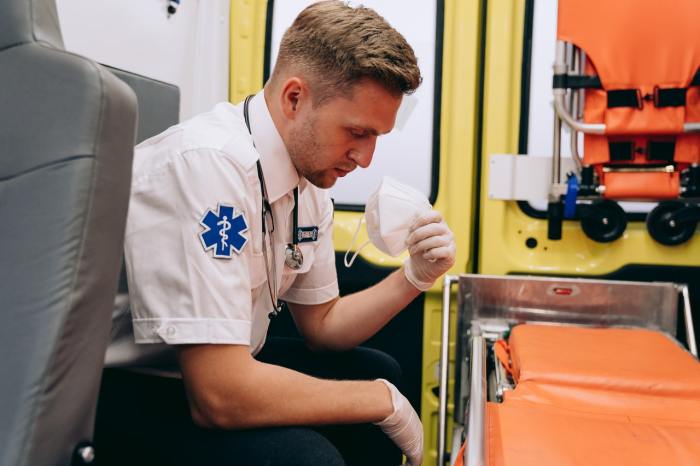Does an off duty emt have a duty to act – The question of whether off-duty EMTs have a duty to act in emergency situations is a complex one that raises important legal, ethical, and practical considerations. This article will explore the various factors that influence an off-duty EMT’s decision to act or not, including legal obligations, ethical principles, training, and situational factors.
Off-duty EMTs are individuals who have completed the necessary training and certification to provide emergency medical services, but who are not currently on duty. While they are not legally obligated to act in an emergency, they may have a moral or ethical obligation to do so.
The decision of whether or not to act is a personal one, and there is no easy answer.
1. Legal Framework

The legal basis for determining an off-duty EMT’s duty to act varies depending on jurisdiction. However, there are several key legal principles that generally apply.
Statutory Law:Many states have enacted Good Samaritan laws that provide limited immunity from liability for individuals who provide emergency assistance in good faith. These laws typically specify that an off-duty EMT is not liable for acts or omissions that occur while rendering emergency care, unless the EMT acts with gross negligence or willful misconduct.
Common Law:In the absence of specific statutory provisions, courts may apply common law principles to determine an off-duty EMT’s duty to act. These principles include the duty to rescue, the duty to aid, and the duty of care.
Case Law:There are numerous cases where off-duty EMTs have been held liable for failing to act. For example, in one case, an off-duty EMT was held liable for failing to provide assistance to a victim of a car accident, even though the EMT was not on duty at the time.
2. Ethical Considerations: Does An Off Duty Emt Have A Duty To Act

Off-duty EMTs face a complex set of ethical considerations when deciding whether to act in an emergency situation. These considerations include:
Beneficence:The ethical principle of beneficence requires healthcare professionals to act in the best interests of their patients. This principle obligates off-duty EMTs to provide assistance to those in need, even if it means putting themselves at risk.
Non-maleficence:The ethical principle of non-maleficence requires healthcare professionals to avoid causing harm to their patients. This principle obligates off-duty EMTs to only provide assistance that they are qualified to provide and to avoid taking actions that could put the patient at further risk.
Autonomy:The ethical principle of autonomy requires healthcare professionals to respect the wishes of their patients. This principle obligates off-duty EMTs to only provide assistance if the patient has consented to it.
3. Factors Influencing Decision-Making

The decision of whether or not to act in an emergency situation is a complex one that is influenced by a variety of factors, including:
Training and experience:Off-duty EMTs who have received extensive training and experience are more likely to be able to provide effective assistance in an emergency situation.
Personal beliefs:Off-duty EMTs’ personal beliefs about their duty to help others can influence their decision to act or not.
Situational factors:The severity of the emergency, the presence of other responders, and the potential risks to the EMT can all influence their decision to act.
4. Training and Education
Off-duty EMTs can enhance their knowledge and skills in responding to emergencies by participating in training and education programs. These programs can provide EMTs with the following:
Updated knowledge:Training and education programs can provide EMTs with the latest information on emergency care techniques and protocols.
Skills practice:Training and education programs provide EMTs with opportunities to practice their skills in a safe and controlled environment.
Confidence:Training and education programs can help EMTs develop the confidence to act in an emergency situation.
5. Organizational Policies and Protocols
Many organizations have policies and protocols in place regarding off-duty EMTs’ duty to act. These policies and protocols can provide guidance and support to EMTs when they are faced with the decision of whether or not to act in an emergency situation.
Clear expectations:Organizational policies and protocols can provide clear expectations for off-duty EMTs regarding their duty to act. This can help to reduce uncertainty and confusion.
Support:Organizational policies and protocols can provide support to off-duty EMTs who act in an emergency situation. This support can include legal protection, financial assistance, and emotional support.
Essential Questionnaire
Do off-duty EMTs have a legal obligation to act in an emergency?
No, off-duty EMTs do not have a legal obligation to act in an emergency. However, they may have a moral or ethical obligation to do so.
What are the factors that influence an off-duty EMT’s decision to act or not?
The factors that influence an off-duty EMT’s decision to act or not include legal obligations, ethical principles, training, and situational factors.
What are the potential consequences of not acting in an emergency situation?
The potential consequences of not acting in an emergency situation include legal liability, ethical guilt, and the loss of life.